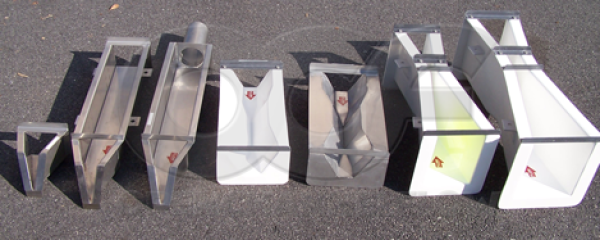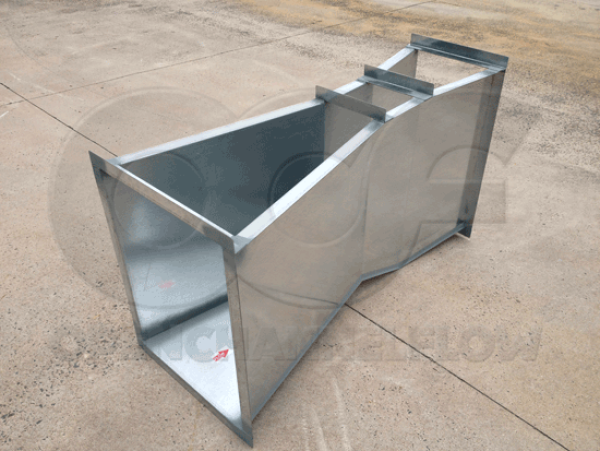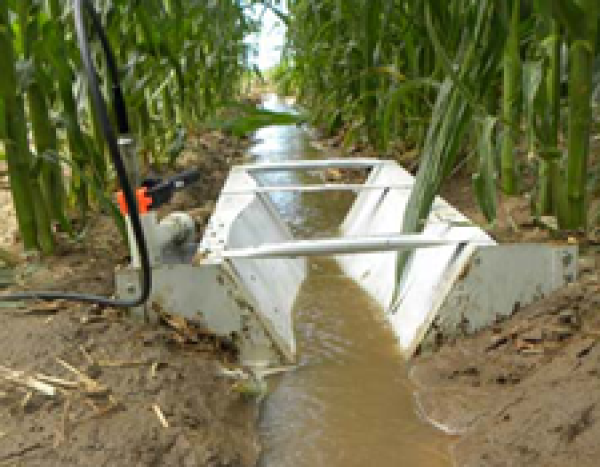This website uses a variety of cookies, which you consent to if you continue to use this site. You can read our Privacy Policy for
details about how these cookies are used, and to grant or withdraw your consent for certain types of cookies.
Galvanized Steel Parshall Flumes for Irrigation Channels
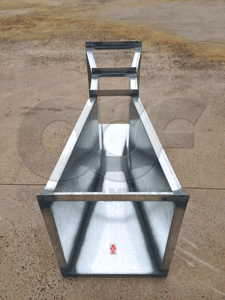 The use of galvanized steel Parshall flumes is common in measuring water rights on irrigation channels. So much so they are almost the default flume / material of construction! In fact, some states specify the use of Parshall flumes by law for certain situations and Dr. Parshall himself used galvanized steel flumes during his investigations of an Improved Venturi flume!
The use of galvanized steel Parshall flumes is common in measuring water rights on irrigation channels. So much so they are almost the default flume / material of construction! In fact, some states specify the use of Parshall flumes by law for certain situations and Dr. Parshall himself used galvanized steel flumes during his investigations of an Improved Venturi flume!
Properly maintained, galvanized steel Parshall flumes can have good service lives. Proactive maintenance – usually on the weld seams and floor of a flume – can extend this. Cold galvanization (available in spray or paint forms), while not a durable as hot dip galvanization, can be applied to wear areas after the surface has been cleaned of any rust.
Relative Material Costs
Galvanized steel Parshall flumes tend to be 2/3 to 3/4 the cost of their fiberglass brethren (which in turn tend to be about 2/3 the cost of their T-304 stainless steel brethren) and can be fabricated in varying material thicknesses as the application demands.
Common Flume Thicknesses
16 gauge construction is common for small Parshall flumes; while 12 gauge (and up) is used for medium Parshall flumes. At the upper end, 3 gauge (1/2-inch [1.27 cm]) thickness is not unheard of for very large Parshall flumes.
If an application is particularly abusive, heavier gauge materials should be used, but be aware that once the protective zinc coating is breached, oxidation (rust) will begin to set in. Simply increasing the material thickness is not a cure-all.
Flume Weight
Fiberglass Parshall flumes typically have a standard sidewall thickness of 1/4-inch [0.635 cm] for flumes from 1-inch to 48-inches in size and 3/8-inch [0.9525 cm] for flumes from 60-inches to 144-inches. Galvanized flumes, on the other hand, range in gauge thickness from 14 gauge to 3 gauge depending upon flume size (a substantial difference in thickness).
As a result, even a relatively small 9-inch Parshall flume in galvanized steel will weight about 65% more than one in fiberglass. This difference in weight grows as the flume size grows, with a 72-inch 3 gauge galvanized steel Parshall flume weighting about 400% more than a fiberglass one.
Needless to say, this can directly impact the cost to install a flume. Many times on even medium flumes sizes, the increased equipment costs more than outweigh the difference in material costs.
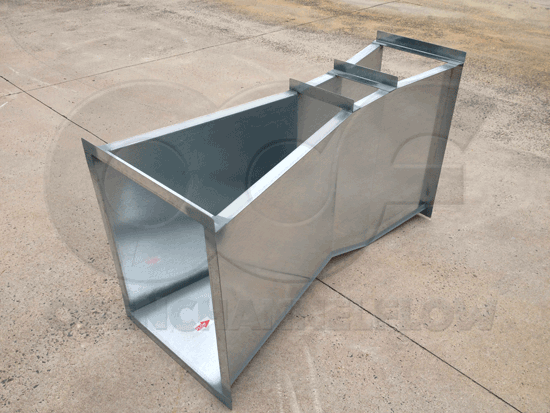
What to Look for in a Galvanized Parshall Flume Manufacturer
In selecting a manufacturer of galvanized steel Parshall flumes it is important to consider not only the fabrication expertise, but also the support of the product.
One of the reasons the Parshall flume is used so often is that the dimensions are standardized and available in a variety of publications. So while manufacturing abilty is part of the story it is not all of it. What is important here is that the manufacturer cannot ony make a good product, but is also well founded in the proper application of that product. A dimensionally correct but poorly applied flume reads no better than poorly dimensioned one.
In selecting a manufacturer there are a couple of things to look for:
- Are flumes a main product line for them?
- If the manufacturer is making feed troughs, fencing, and flumes, how much do they really know about flumes?
- Heavy gauge construction
- Thinner gauge construction costs less - don't be fooled by price alone!
- Generous cold galvanization on all welds and cut seams
- These are the weak links in a galvanized flume - make sure they are well sealed
- External ribbing on larger Parshall flumes
- It cost more to put ribbing on the outside, but ribbing can be essential in making sure sidewalls / floors do not distort
- Expertise in applying flumes
- Sooner or later you will have questions - can the manufacturer answer them?
- Customer service options that fit the way YOU work
- Is there only one way to reach them? On their hours and not yours?
- Warranty support
- It's one thing to sell a flume, it's another to be able to support it
Sales support – both before and after a sale – can make a break an installation. Many who use Parshall flumes have experience in their use, not their application.
It’s not uncommon for questions to arise during the installation of a flume or after a flume is in operation, so the ability to get a fast (and above all accurate) response is important. Customer service and the ability to get questions answered through multiple channels can be key!
Related Blog Posts
Explore more insights in our blog.

LOCATIONS IN ATLANTA, GA & BOISE, ID



